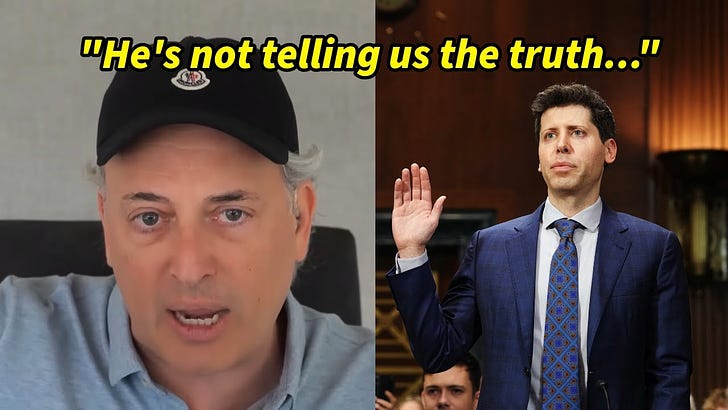Digest 27: Attack on Israel; Putin wants to negotiate (which we’re never told about); Marc Andreessen on what it’s like to become a billionaire
Attack on Israel
Initial thoughts: this has the potential to be a significant tectonic shift.
A compelling argument it’s to do with Israeli-Saudi peace talks, and the race between Saudi Arabia/Iran to get nukes:
*
What’s happened is significant/awful enough it will surely tie in the U.S./Iran/Russia geopolitically. This is early to say, but might this thus have potential to become a second proxy war (in addition to Ukraine) in what many are now dubbing ‘Cold War II’?
A further line of argument on the attack being opportunistic:
This post doesn’t further say that most weapons/ammo reserves typically held in Israel have been depleted and already sent to Ukraine.
Judging from Jake Sullivan’s recent comments, it seems the U.S. was caught entirely off guard by this.
The most neutral post I’ve seen, from the WSJ’s chief foreign affairs correspondent:
And from a look this morning, the most comprehensive aggregation of on-the-ground coverage from anyone I follow is actually from Bill Ackman.
Putin wants to negotiate
A principle: We should listen directly to other foreign leaders. Even ones who are at war with our allies.
Putin in a sit down two weeks ago: ‘We have never refused negotiations. But we don’t hear anything from the other side.’ (10 seconds)
Secretary Blinken tells the American public Putin has no interest in talking (10 seconds):
But from the recent Eastern Economic Forum in Vladivostok, this is the opposite of what Putin is saying:
https://www.youtube.com/live/5oH5AYTBdU8?si=Oh5B_TZBIdq8cMOt&t=7775 (watch this for 1 minute)
The decree Putin talks about, covered by Reuters: https://www.reuters.com/world/europe/zelenskiy-decree-rules-out-ukraine-talks-with-putin-impossible-2022-10-04/
We should of course have caution in taking Putin at his word. But the U.S. Secretary of State should not blatantly misrepresent what Putin is saying – in conjunction with all Western media ignoring it.
*
I went along to Cliveden Literary Festival last weekend. Ukraine was a hot topic in most of the panel discussions I attended. Almost everyone seemed quite delusional to me: thinking Russia is militarily weak, Ukraine strong. (This all the way up to the former director of MI6 who was speaking.) Almost no mention of NATO expansion being a contributing cause of Russia’s invasion. The sole cause according to almost all speakers was Putin’s imperial ambitions.
An interesting observation: many distinguished speakers were willing to admit mistakes made 20+ years ago: Iraq, and buying into the ‘end of history’… yet simultaneously there was no open-mindedness that consensus today might be wrong.
Pro-war polling doesn’t hold up
I sometimes hear (in the UK) ‘support for Ukraine polls very well’. Politicians almost certainly make judgements guided by this.
But, historically, this doesn’t hold up well.
Seymour Hersh talking tongue-in-cheek about some past electoral candidates who’ve fatally used this pro-war logic (1-minute):
If you poll people right now: ‘do you support Ukraine?’, the answer is majority yes – as it would have been support for the U.S. winning in Vietnam or Iraq.
But pose a more nuanced question: would you like to minimise the chance of WWIII, bring a stop to tens of thousands being killed, and bring down inflation? The answer would surely also be yes.
Trump’s surge in the Republican party – and him now being 53% likely to be next U.S. President according to bookmakers – standing on a platform of ‘stop the dying’, is evidence that public support for continued escalation in Ukraine is not as robust as binary polling suggests. Politicians need to stop being so simplistic.
South Korea as a model for Ukraine?
Looking back at a February 2023 New Yorker interview with Stephen Kotkin:
If you look at the North Korea–South Korea outcome, it’s a terrible outcome. At the same time, it was an outcome that enabled South Korea to flourish under American security guarantees and protection. And, if there were a Ukraine, however much of it—eighty per cent, ninety per cent—which could flourish as a member of the European Union and which could have some type of security guarantee—whether that were full NATO accession, whether that were bilateral with the U.S., whether it were multilateral to include the U.S. and Poland and Baltic countries and Scandinavian countries, potentially—that would be a victory in the war.
Niall Ferguson is now beginning to argue the same:
Rather than risk a protracted war with the added danger of waning Western support, Ukraine needs to lock in what it has already achieved. It has exposed the limits of Russian military power. It has established credible claim to EU membership. It has transformed its international image from a den of corruption to a land of heroes.
More than you might think can be achieved while you await the return of enemy-occupied territories. Think only of South Korea’s extraordinary economic and political progress over 70 years, even though the armistice of 1953 has never become a fully fledged peace and there remains a highly dangerous border zone between it and a hostile neighbor.
Sam Altman’s plan to be a trillionaire?
Interesting theory from David Sacks (clip for 5 mins)…
More on Sam Altman’s other non-Open AI investments here.
Marc Andreessen – what it’s like to become a billionaire:
And how the ‘super-elite’ gets moulded to think alike (a few minutes, direct from someone worth ~$1.8bn):
This picked up again for a minute here.
*
Thanks for reading/watching. Hope you enjoyed!







Great post. You put me onto the All-in podcast, and I was really struck by what Sacks said when I listened to it at the time as well!